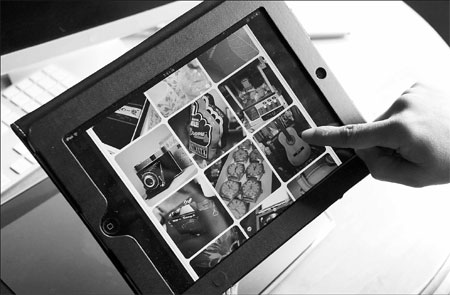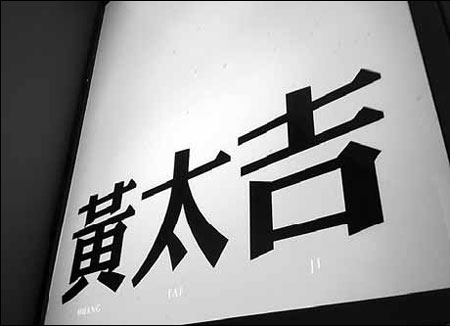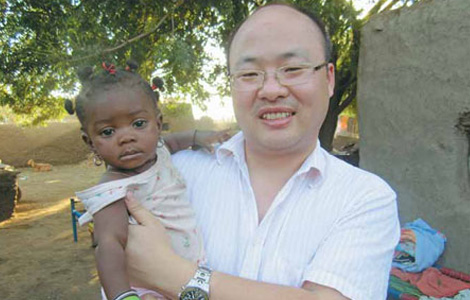Small stores rely on new retail revolution
Updated: 2013-04-30 07:50
By Xu Junqian in Shanghai (China Daily)
|
||||||||
|
An operator of a small store introduces newly arrived goods through Sina Weibo to netizens in 2012. It is a thing-to-thing exchange store, which is on Tongming road, in Hongkou district, Shanghai. The unusual store attracts many customers. Provided to China Daily |
|
Sina Weibo page of BYD Auto Co Ltd. Feng Yongbin / China Daily |
|
Logo of Huangtaiji in Chinese. |
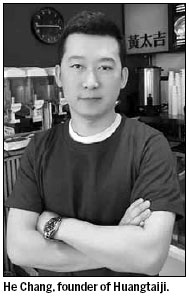
For the past eight months, 31-year-old He Chang has been promoting his products on what is arguably China's most powerful retail marketing tool, and they have been selling like hotcakes.
His Chinese pancakes, or jianbing guozi - a famous product enjoyed by millions of people for centuries - have become a hot topic on Sina Weibo, China's most popular social network, which now boasts over 500 million users.
While the Twitter-like social network, which kicked off in August 2009, is yet to make a profit - its latest financial report showed an income of $66 million dollars in 2012 against expenditures of $150 million - thousands of shrewd entrepreneurs such as He have managed to establish money-making businesses on the back of the platform, by grabbing the attention of more than a third of the nation's population.
"So far, we have 300,000 verified corporate users," explained Hu Weixi, who works in Weibo's business management department, which was set up a year ago.
Although there is no distinction as to whether its verified-business "blue V" users are start ups or multinationals, Hu says the number of small operators like He could be "substantial".
Last December, Weibo's Hu and his team launched an online campaign called "those small and beautiful stores on Weibo", so more users could know about these "tiny but unique stores that were submerged in the sea of millions-of-followers-owning big Vs".
"We have received more than 2,000 applications, far more in number and richer in diversity than we expected," said Hu.
A total of 118 corporate users have been selected and listed, free of charge, on an electronic-magazine-like page, approximately 30 stores a month, which features banner ads on the page of every user, with links to every one of the other stores.
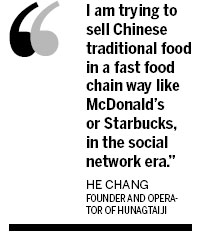
The stores vary from sneaker makers to organic farms, cafes, bridal gown makers, music venues and clothing.
"The service has attracted more than 2 million clicks, and followers of some stores have been increasing several times over as a result," said Hu. "I wouldn't say it's the most successful campaign, but definitely one of the most."
In the case of pancake-seller He Chang,whose business is called Huangtaiji, selling products at 9.5 yuan ($1.53) a packet, the power of Weibo is more than just a click or the odd extra follower.
Last August, the Harbin native opened his first eatery in the central business district of Beijing, with 13 seats, selling his hometown specialties - fried dough sticks wrapped in an omelet with spicy or sweet sauces - together with other Chinese traditional breakfast items such as soya milk and jellied bean curd.
He registered the outlet's business account on Weibo at the same time, and his marketing creativity so far has been impressive.
As well as responding to online orders, or posting mouth-watering pictures of meals at midnight, the account has been catching attention because of the pictures he has been posting showing himself delivering pancakes in his Mercedes or with his beautiful wife.
He claims that every one of the 70,000 comments left on the account so far have been sent a response.
"I am trying to sell Chinese traditional food in a fast-food chain way like McDonald's or Starbucks, in the social network era," said He, though he says it's impossible to calculate how many of his customers have been attracted to his place because of Weibo.
In an interview with Chinese business magazine Entrepreneur early in April, He disclosed that annual sales at his outlet are likely to reach 5 million yuan, and he estimates the business is now worth 40 million yuan.
He refuses to confirm the figures to China Daily, but he did suggest he had paid off his first round of financing.
Meanwhile, 29-year-old Shanghai office worker Tu Jing says she has been "kind of falling in love" with online shopping, or at least collecting shopping information on items, on Weibo.
Her favorite online shopping destination used to be Taobao.
"There is something very basic, almost human, about interaction with an online store, and with other customers online," she said.
"It's just like being back in your childhood, when you could sometimes get a free lollipop from the boss of the local store in your neighborhood.
"It's great when you hear about complaints about something from another store, even though they are strangers in real life.
"That's something you never get from the big-box stores," said Tu.
She adds that she loves the experience of telling her favorite cookie bakery on Weibo, how low-fat she wants her biscuits to be, and next time she buys cookies from the store, without a word, the boss offers exactly the low-fat kind she wants.
This idea of a shopping community coincides with what Jack Ma, the founder of Alibaba Group and Taoboa, now China's largest shopping platform, is believed to want for his sites - a growing population of small-businesses users.
Having earned 1 trillion yuan in turnover in 2012 and attracting big names like Nike, Canon and Sumsung to its two sites - the customer-to-customer Taobao.com and business-to-customer Tmall - Ma has said he believes "the future of e-commerce lies in small business".
"Small is beautiful," he told a forum in September, claiming small businesses are not only the roots of his e-commerce empire, but also the future drivers of the global economy over the next two decades.
The 49-year-old billionaire said he was inspired to support small businesses during a trip to Japan a few years ago, where he saw a tiny rice cake store with a sign saying "founded 147 years ago".
Intrigued, Ma gave his patronage to the store, run by an elderly lady, and said he started to "find the charm and beauty" that big businesses often lack today.
The first step in his support was to introduce the "double million" project, which aims to help 1 million small stores achieve annual sales of 1 million yuan.
Three months after Ma's speech, during the "double 12" one-day online sales extravaganza on Taobao - named after the date it fell on, Dec 12, which featured thousands of stores offering special bargains and sales offers - 80 percent of its 6 billion yuan turnover came from its "small and beautiful" stores, an "unprecedented" performance, said officials.
Jiang Peng, the president of Taobao, attributed the massive share of the business to the level of service these small stores can offer, which customers cannot find elsewhere.
Jiang said he believed the stores don't need to, and hardly ever do, grow very big because of the size of the market they are catering to.
That is certainly not He's plan for his pancake business.
A Manchurian, who named his eatery after his royal ancestors who started the last feudalistic dynasty, the Qing Dynasty (1644-1911), He says he wants to create a "new era just as my forefathers did, but mine is about pancakes."
He dreams his jianbing will be talked about in foreign countries without the suffix "the Chinese pancake".
He plans to open five to six Huangtaiji's in Beijing, and later expand to cities like Shanghai, Shenzhen or even New York and London.
What's more, He hopes that within five to seven years, he can also be self-sufficient in all the materials used to make his pancakes, already claimed to be "all-green" with no chemical or additives.
xujunqian@chinadaily.com.cn
(China Daily 04/30/2013 page9)
Most Viewed
Editor's Picks

|

|

|

|

|

|
Today's Top News
Three buried after lab explosion
Willem-Alexander ready to be Dutch King
Can earthquakes be predicted?
City unites to say farewell
Beauties turn entrepreneurs
Small stores rely on new retail revolution
Flooding season nears in Ya'an
Taobao creates job specifications
US Weekly

|

|
